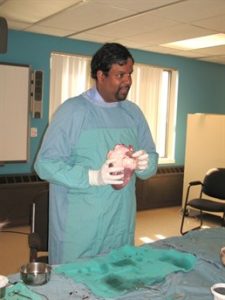Janine Doucet, Administrative Director, New Brunswick Heart Centre.
With the mission of delivering the highest quality cardiovascular care, New Brunswick Heart Centre physicians and staff are continuously looking for the best possible ways to treat their patients.
Occasionally these procedures and treatments are developed elsewhere, but more and more often, the Heart Centre is taking part in discovering the best ways to treat patients – through leading-edge research.
“Research at the Heart Centre has taken many forms since the centre was formed,” says Dr. Ansar Hassan, a cardiac surgeon who also holds a Ph.D. in clinical epidemiology.
Initially, research was largely in the form of cardiology and cardiac surgery clinical trials. Patients were given new drugs or procedures, or a combination of existing therapies, to help deduce the usefulness of various treatments.
These trials could be funded by industry partners or as part of multi-centred trials funded by peer-reviewed granting agencies. Today, more research comes in the form of ‘homegrown’ trials that originate with Heart Centre physicians and employees.

Dr. Ansar Hassan during a teaching session.
Altogether, the Heart Centre has as many as 20 clinical trials occurring at any time.
No matter what type of trial, the reason for its undertaking is the same.
“When you look at research it’s not really just about running the trial and coming up with a result. It’s about trying to make patient care better,” says Hassan. “It’s about identifying what are important issues for your patients, what ails them, and what intervention could potentially make them better.”
Dr. Sohrab Lutchmedial, an interventional cardiologist and director of the New Brunswick Heart Centre Research Initiative, notes that whileNew Brunswick has a relatively small population base, the Heart Centre is well positioned to do top-level research.
“It’s actually a really unique situation in many regards. As the only cardiac centre in the province, all patients who require surgery or intervention come through our doors,” he says.
The Heart Centre serves nearly one million people inNew BrunswickandPrince Edward Island, making it one of the largest in the country by population served.
This opens the door to many large multi-centred clinical trials, such as the “Courage” trial. Running from 1999-2006, this trial determined that for some patients with blocked arteries, treatment with medication and a healthy lifestyle was better than having an angioplasty, for which a balloon is used to clear the artery.
“The conventional thinking was if someone had a blocked artery, you had to fix it no matter what,” says Lutchmedial. “This trial showed that if a patient is put on a proper diet and exercise plans, given the right medications and refrained from smoking, they would do just as well as they would with angioplasty.”
The trial has led to a drastic change in how those patients are treated, providing, in Lutchmedial’s words, “better medicine.”
While clinical trials are an important part of research, they are not the only avenue for discovery. Hassan and Lutchmedial both stress the importance of outcomes-based research. In this type of research, patient histories and data are examined following their procedures or treatments at the Heart Centre. Drawing on the data from a large group of individuals, physicians are able to develop hypotheses for better treatments.
For example, this type of research can answer complex questions, such as how women do compared to men amongst those who have had cardiac surgery?
“You are taking real-world medicine and you try to answer questions based on what has actually happened,” says Hassan.
While the research done by the Heart Centre has undoubtedly had a major impact on New Brunswick patients, physicians and staff are also having an impact nationally and internationally, sharing research at major conferences and bringing their findings to the world. Researchers from the Heart Centre have five presentations to present at the next Canadian Cardiovascular Congress.
The Heart Centres’ research capacity continues to grow. Recently, thanks to the new affiliation with Dalhousie Medicine NewBrunswick, two laboratory-based science researchers have been hired to begin research at a molecular level.
“It’s where you have scientists carrying out research in a laboratory, looking for example at the patient DNA to determine why illnesses occur in some patients but not others,” says Hassan. “I can confidently say that we are truly developing the full continuum of cardiovascular research inSaint John and inNew Brunswick.”